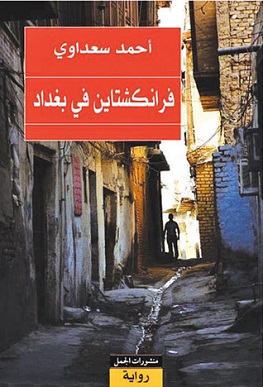
Grand Ayatollah Sayyid Abu al-Qasim al-Musawi al-Khoei was an Iranian-Iraqi Shia marja'. Al-Khoei is considered one of the most influential twelver scholars.

Grand Ayatollah Sayyid Muhammad-Saeed al-Tabataba'i al-Hakim was an Iraqi senior Shi'a marja, one of the Big Four Grand Ayatollahs of the Hawza of Najaf and one of the most senior Shia clerics in Iraq after Ayatollah Ali al-Sistani.

Muhsin Al-Ramli is an expatriate Iraqi writer living in Madrid, Spain since 1995. He is a translator of several Spanish classics to Arabic. He produced the complete translation of Don Quixote from Spanish to Arabic. He teaches at the Saint Louis University Madrid Campus. He is the current editor of Alwah, a magazine of Arabic literature and thought, which he co-founded.

Sayyid Ammar al-Hakim is an Iraqi cleric and politician who led the Islamic Supreme Council of Iraq, from 2009 to 2017.
Muḥsin Sayyid Mahdī al-Mashhadani was an Iraqi-American Islamologist and Arabist. He was a leading authority on Arabian history, philology, and philosophy. His best-known work was the first critical edition of the One Thousand and One Nights.
Muhammad Taqi-ud-Din bin Abdil-Qadir Al-Hilali was a 20th-century Moroccan Salafi, most notable for his English translations of Sahih Bukhari and, along with Muhammad Muhsin Khan, the Qur'an, entitled The Noble Qur'an.

Iraqi literature or Mesopotamian literature dates back to Sumerian times, which constitutes the earliest known corpus of recorded literature, including the religious writings and other traditional stories maintained by the Sumerian civilization and largely preserved by the later Akkadian and Babylonian empire. Mesopotamian civilization flourished as a result of the mixture of these cultures and has been called Mesopotamian or Babylonian literature in allusion to the geographical territory that such cultures occupied in the Middle East between the banks of the Tigris and Euphrates rivers.

Literature from the "Axis of Evil" is an anthology of short stories, poems and excerpts from novels by twenty writers from seven countries, translated into English, and published by Words Without Borders in 2006.

Sheikh Muhammad-Hasan Abi al-Mahasin al-Janaji al-Ha'eri was an Iraqi poet and politician. He was most famous for his participation in the Iraqi revolt of 1920.
Muhsin is a masculine Arabic given name. The first person known to have the name "Muhsin" was Muhsin bin Ali, the son of Ali ibn Abi Talib and Fatimah bint Muhammad.

Hassan Mutlak (1961–1990) was an Iraqi writer, and was hanged in 1990 at the age of 29 for an attempted coup d'état. He was considered among the intellectuals of his country to be the Federico García Lorca of Iraq. He is the brother of the writer and poet Muhsin al-Ramli.
Yasmeen Hanoosh is an academic, fiction writer, and translator from Iraq. She was born in Basra in 1978. She moved to the United States in 1995, subsequently obtaining a BA, MA and PhD from the University of Michigan. The title of her doctoral thesis, submitted in 2008, was "The Politics of Minority: Chaldeans between Iraq and America". She is currently a professor of Arabic at Portland State University.
Ramli is a surname. Notable people with the surname include:
The International Prize for Arabic Fiction Nadwa is an annual writers' workshop for young writers from the Arab world. Held under the aegis of the International Prize for Arabic Fiction, the nadwa is the first such workshop for Arab writers and has been an annual event since 2009.

The President’s Gardens is a novel written by the Iraqi author Muhsin al-Ramli. Set during the last fifty years of Iraqi history, this novel tells the story of three friends, exploring how ordinary people have been affected by historic events such as wars, the blockade of Iraq and the invasion of Kuwait. It examines the gap between the lifestyle of those in power and ordinary citizens. During the chaos of occupation, one of them loses his life, like so many caught between loyalists of the old and new regimes. The President's Gardens helps the reader understand the complexities of the successive tragedies besetting the ‘land between two rivers’. The gripping story is told with humanity, and life is somehow the victor despite all the obstacles.
The Hakim family is a prominent family of Shiite Islam scholars from Najaf, Iraq who claim descent from the Islamic prophet Muhammad. They belong to a Tabatabaei branch whose scholarly involvement has revolved around Iraq for centuries. The family faced extensive persecution and executions at the hand of Saddam Hussein's government, yet it maintains a prominent role in Iraq and the Middle East.

Frankenstein in Baghdad is an Arabic novel written by the Iraqi writer Ahmed Saadawi. It won the IPAF award for 2014. The novel was translated into English by Jonathan Wright.

Muhsin Baqir al-Musawi al-Qazwini is an Iraqi author, politician, essayist, college professor, and founder of the Ahl al-Bayt University in Karbala.

Isa Hasan al-Yasiri is an Iraqi-Canadian poet. He was born in a village in southern Iraq, located near the town of Al-Kumait in the Maysan Governorate. He completed his primary education between the village school and Al-Kumait school, and intermediate and higher education in the Teachers' House in Al-Amarah. After graduating, he worked in education, radio and literary journalism. Among his generation, Al-Yasiri is distinguished in his poetry and personal life for exclusivity and independence from the Iraqi Ba'athist authority. He left his country in the fall of 1998, and lived in Jordan for two and a half years before arriving in Canada at the beginning of 2001 and moving to Montreal. He has published approximately eight poetry collections, beginning in 1973.

Rabab Al-Kadhimi was an Iraqi feminist poet and dental surgeon, who is considered a pioneer of women's poetry.